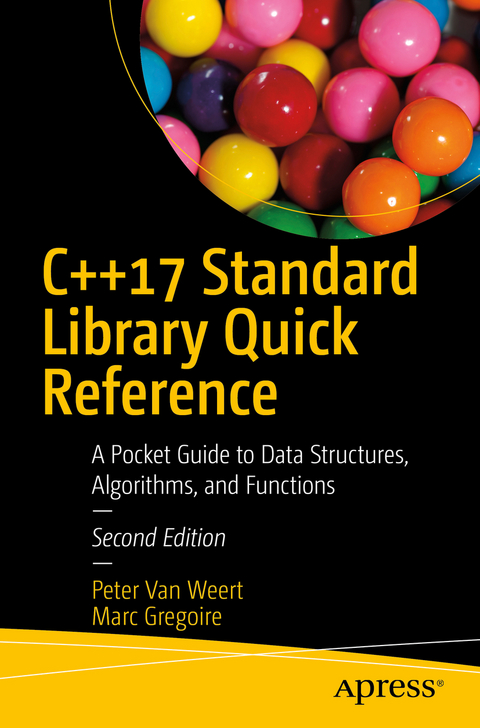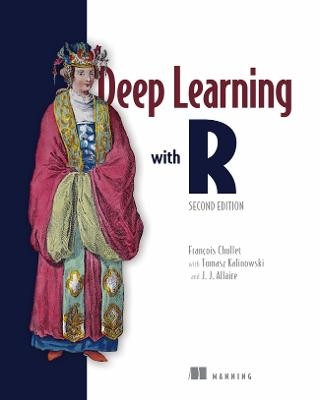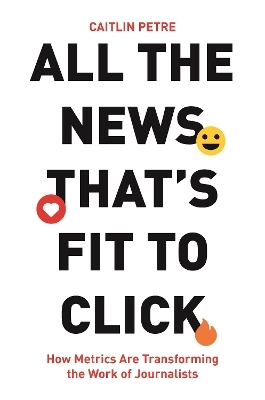
C++17 Standard Library Quick Reference
Apress (Verlag)
978-1-4842-4922-2 (ISBN)
It is hard to remember all the possibilities, details, and intricacies of the vast and growing Standard Library. This handy reference guide is therefore indispensable to any C++ programmer. It offers a condensed, well-structured summary of all essential aspects of the C++ Standard Library. No page-long, repetitive examples or obscure, rarely used features. Instead, everything you need to know and watch out for in practice is outlined in a compact, to-the-point style, interspersed with practical tips and well-chosen, clarifying examples.
This new edition is updated to include all Standard Library changes in C++17, including the new vocabulary types std::string_view, any, optional, and variant; parallel algorithms; the file system library; specialized mathematical functions; and more.
What You Will Learn
Gain the essentials that the C++ Standard Library has to offer
Use containers to efficiently store and retrieve your data
Inspect and manipulate your data with algorithms
See how lambda expressions allow for elegant use of algorithms
Discover what the standard string class provides and how to use it
Write localized applications
Work with file and stream-based I/O
Prevent memory leaks with smart pointers
Write safe and efficient multi-threaded code using the threading libraries
Who This Book Is For
All C++ programmers, irrespective of their proficiency with the language or the Standard Library. A secondary audience is developers who are new to C++, but not new to programming, and who want to learn more about the C++ Standard Library in a quick, condensed manner.
Marc Gregoire is a software engineer from Belgium. He graduated from the University of Leuven, Belgium, with a degree in “Burgerlijk ingenieur in de computer wetenschappen” (equivalent to Master of Science in engineering in computer science). The year after, he received the cum laude degree of master in artificial intelligence at the same university. After his studies, Marc started working for a software consultancy company called Ordina Belgium. As a consultant, he worked for Siemens and Nokia Siemens Networks on critical 2G and 3G software running on Solaris for telecom operators. This required working in international teams stretching from South America and USA to EMEA and Asia. Now, Marc is working for Nikon Metrology on industrial 3D laser scanning software. His main expertise is C/C++, and specifically Microsoft VC++ and the MFC framework. He has experience in developing C++ programs running 24x7 on Windows and Linux platforms; for example, KNX/EIB home automation software. Next to C/C++, Marc also likes C# and uses PHP for creating web pages. Since April 2007, he received the yearly Microsoft MVP (Most Valuable Professional) award for his Visual C++ expertise. Marc is the founder of the Belgian C++ Users Group, author of Professional C++ and a member on the CodeGuru forum (as Marc G). Peter Van Weert is a Belgian software engineer, whose main interests and expertise are programming languages, algorithms, and data structures. He received his master of science in computer science summa cum laude with congratulations of the Board of Examiners from the University of Leuven. In 2010, he completed his PhD thesis on the design and efficient compilation of rule based programming languages at the declarative programming languages and artificial intelligence department of the same university. During his doctoral studies, he was a teaching assistant for object-oriented programming (Java), software analysis and design, and declarative programming. After graduating, Peter joined Nikon Metrology to work on large-scale, industrial application software in the area of 3D laser scanning and point cloud inspection. At Nikon, he has mastered C++, refactoring and debugging very large code bases, and has gained further proficiency in all aspects of the software development process, including the analysis of functional and technical requirements, and agile and scrum-based project and team management. In his spare time, he has co-authored two award-winning Windows 8 apps, and is a regular speaker at and board member of the Belgian C++ Users Group.
Introduction.- 1. Numerics and Math.- 2. General Utilities.- 3. Containers.- 4. Algorithms.- 5. Stream I/O.- 6. Characters and Strings.- 7. Concurrency.- 8. Diagnostics.- A. Appendix.
| Erscheinungsdatum | 16.08.2019 |
|---|---|
| Zusatzinfo | 252 Illustrations, black and white; XXIII, 293 p. 252 illus. |
| Verlagsort | Berkley |
| Sprache | englisch |
| Maße | 155 x 235 mm |
| Themenwelt | Mathematik / Informatik ► Informatik ► Programmiersprachen / -werkzeuge |
| Informatik ► Theorie / Studium ► Algorithmen | |
| Informatik ► Theorie / Studium ► Compilerbau | |
| Schlagworte | C++ • C++ 17 • C++17 • Code • Cplusplus • programming • Quick • Reference • Standard Library • STL • Syntax • Templates |
| ISBN-10 | 1-4842-4922-4 / 1484249224 |
| ISBN-13 | 978-1-4842-4922-2 / 9781484249222 |
| Zustand | Neuware |
| Informationen gemäß Produktsicherheitsverordnung (GPSR) | |
| Haben Sie eine Frage zum Produkt? |
aus dem Bereich


